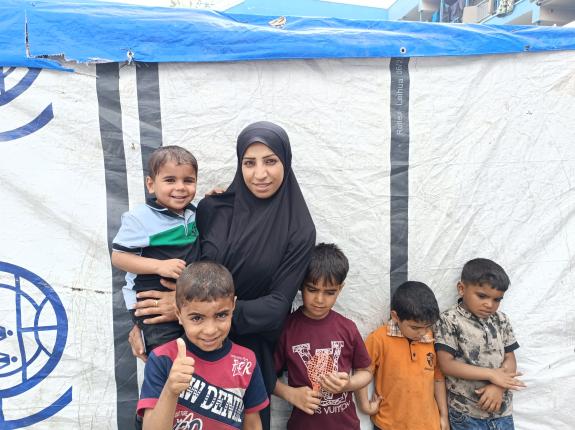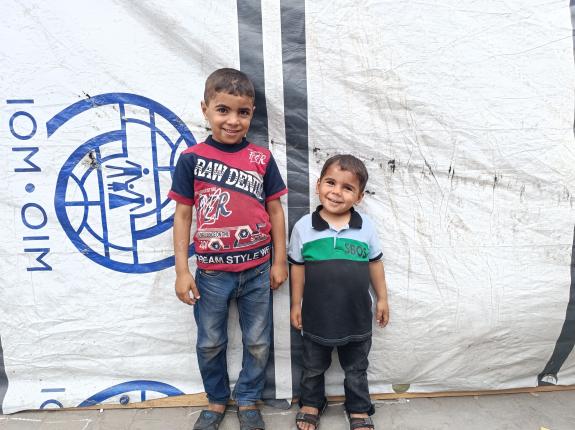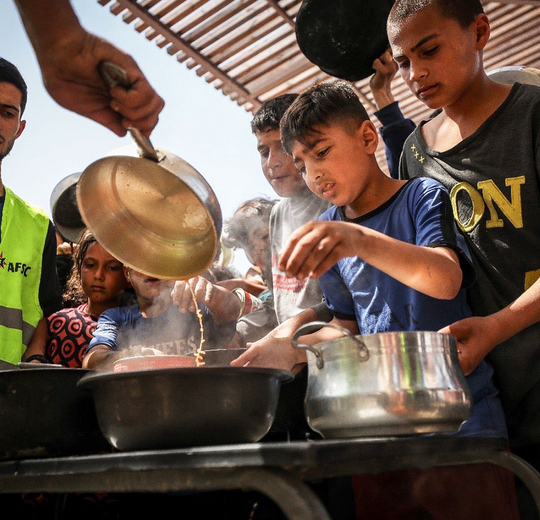My name is Aisha Osama Abu Ajwa, I am 30 years old. I am from Al-Zaytoun neighborhood. Before the war, I could barely provide for their needs to secure a decent life for my 4 children. Now, the crimes of the occupation added two orphaned children for me to care for and nurture after the occupation killed their parents. I am now a mother of 6 children.
I used to live in al-Zaytoun neighbourhood in the southeast of Gaza City with my husband, Kamal Abu Zour, and our four children in our home safely and peacefully. My husband’s parents and his married siblings also lived with us in the same house. We lived together as a happy Palestinian family, sharing everything between us. But during this war, we shared pain in an indescribable way.
After the birth of my fourth son, my husband and I agreed to be content with the children that God had blessed us with, so we focused on raising our four children. The requirements of life are very demanding. We could barely provide for their needs to secure a decent life for them. But in this war, the crimes of the occupation added two orphaned children for me to care for and nurture after the occupation killed their parents. I am now a mother of six children.
During the last day of the temporary cease-fire at the end of November 2023, where Israeli prisoners were released in exchange for Palestinian prisoners, we lived on edge. We feared the return of the war.
My husband’s sister-in-law and my friend Iman Salah Abu Zour went to visit and check on her family two days after the temporary cease-fire ended. She expected the temporary ceasefire to be extended, so she took her children with her: Rayan Ahmed Abu Zour, seven years old, Abdul Rahman, three years old, Adam, four years old, and Kan’an, one-and-a-half years old. My friend Iman was eager to see her mother, father, and siblings, as she hadn’t seen them for over 50 days of the Israeli war on the Gaza Strip. Shortly after she arrived at her family’s house on 3 December 2023, the Israeli forces bombed the entire residential block, killing Iman and her children Adam and Kan’an. Her children Rayan and Abdul Rahman were seriously injured.
Rayan and Abdul Rahman stayed in the intensive care unit for several days. Rayan was wounded with shrapnel all over his body and had third-degree burns on his right leg. The shrapnel is still lodged in his body. Abdul Rahman, or “Aboud” as we like to call him, was wounded with shrapnel in his head and remained in a coma for a week.
The children’s injuries were severe, and I prayed to God at all times for their safety, as they are the remaining children of their young father, Ahmed, who had lost his wife and two of his kids. After their wounds healed slightly, I took them to live in my house with my children. I love them, and my children love them. We used to live together in one house, each with our own apartment, but today, they are just like my own children.
The two children, Rayan and Abdul Rahman, have not recovered from the shock of losing their mother and siblings, and the wounds that the occupation inflicted upon them have not fully healed.
Three months after the martyrdom of their mother and siblings, on 20 February 2024, the occupation forces suddenly stormed the area of the Zaytoun neighbourhood, besieging us in our homes amidst heavy gunfire.
We couldn’t leave our homes due to the intensity of the Israeli shelling. The bombardment and gunfire were indiscriminate and intense in our area. Quadcopter aircrafts fired at anyone who moved or tried to leave the area. The occupation forces advanced, blowing up the doors of houses and storming brutally into homes.
I tried to calm the six children, but all my attempts failed due to the severity of the violent shelling and relentless gunfire. The sounds of explosions drowned out all my attempts to calm them. My husband, Kamal Abu Zour, and several other young men, including his brother Ahmed, the father of the two children, were arrested and taken to an unknown location. We remained in the house, waiting for our turn to be killed or arrested.
The shock to the orphaned children, Rayan and Abdul Rahman, was immense. The occupation had arrested their father, Ahmed Ayyash Abu Zour, in front of their eyes. We were afraid for their fate, screaming for them to not be killed. We didn’t know what would happen to them. Later, I learned of their father’s martyrdom during his arrest.
The occupation forces stormed our house and asked us to leave. They allowed us to go out, but they prevented me from taking a bottle of water for the children. I wanted to grab my small child’s bag with supplies and diapers, but they stopped me from taking it. I walked out of the house amidst soldiers and tanks, holding onto the six children, not knowing where to escape with them.
The occupation forces asked me to walk on Salah al-Din Street towards the central and Southern areas of the Gaza Strip. We left our house after being besieged by the occupation forces for several hours. I walked with the six children on foot among the tanks, occupation vehicles, and soldiers, with the relentless shelling continuing for over 15 kilometers [9.3 miles].
We had no food or water, and fear gripped the children’s hearts in an indescribable manner. I screamed and cried, begging the soldiers to stop firing, but the shelling intensified. I walked with difficulty due to extreme fear. The children witnessed dozens of martyrs’ bodies strewn on the ground. They cried intensely, while blood covered the streets.
The children asked for water, but I had nothing with me. We walked beside one of the tanks, which was moving quickly. The child Abdul Rahman fell into a pit by the road, just one meter away from the tank. I screamed at the soldiers and raised my hands for them to stop. They pulled the child out of the pit, and we continued our journey of death among the merciless occupation’s armoured vehicles.
I walked with the six children from the Zaytoun neighbourhood to the Nuseirat refugee camp, a distance of about 15 kilometres [9.3 miles]. I carried the six children, including my youngest, a seven-month-old, and the eldest, Rayan, who is seven years old. The weather was extremely cold. When I reached the entrance of the Nuseirat camp, I screamed at the top of my lungs, “Where am I?” People told me that I was in the Nuseirat camp. We drank salty water, and I fed the children bread and lentils provided by the people of Nuseirat. We survived death that night, but Rayan and Abdul Rahman lost their father, a martyr.
I wandered on the street in the Nuseirat refugee camp in the Gaza Strip, waiting for my husband Kamal and his brother Ahmed, the father of the two children, Rayan and Abdul Rahman. Then, the people of Nuseirat offered me and my family a place to stay in a small shop. Later, I learned that my husband had arrived at a school belonging to the United Nations Relief and Works Agency (UNRWA), in the middle of the camp. When my husband arrived at the school, he was only wearing underwear and was barefoot. A group of men, including my husband, had been arrested by the occupation forces for several hours, stripped of all their clothes, and interrogated. Then they were thrown onto the street.
The six children and I headed to the school and reunited with my husband on 21 February 2024. We arrived at the school center without clothes, shoes, food, or water. We had no permanent shelter; we had lost everything. I wandered the school looking for a place to sleep until I found a space in one of the classrooms. We slept on only a blanket and mattress on the floor. The living, health, and environmental conditions in the school were extremely difficult. We had no shelter of our own; we had lost everything.
My husband told me that the occupation forces killed his brother Ahmed, the father of the two children, Rayan and Abdul Rahman, in front of his eyes. The occupation forces interrogated my husband and his brother, but then released them. As they were leaving the area of the occupation vehicles, the occupation forces fired directly at them. Ahmed was shot in the foot and abdomen. He was martyred on Salah al-Din Street in the passage that the occupation claimed was safe. My husband tried to retrieve his body, but the occupation forces fired at him. Ahmed’s body remained lying on the ground among the occupation vehicles until stray dogs devoured it.
I have been living for three months in a school for displaced persons in the Nuseirat camp in the middle of the Gaza Strip. I live on three small mattresses with my six children. They are my sons Murad, six years old; Karam, five years old; Anas, four years old; Adi, seven months old; and the orphaned children Rayan, seven years old, and Abdul Rahman, three years old.
Rayan and Abdul Rahman are still suffering from their injuries sustained in the shelling that killed their mother and siblings. Shrapnel is still lodged in Rayan’s head and face. He also has burns on his right foot. The shrapnel has not been removed from his body due to poor health conditions and the continuation of the war on the Gaza Strip. Abdul Rahman also suffers from a skull fracture, fluid in the testicles, constantly high blood sugar, and pain all over his body. All of my children suffer from difficulty sleeping and involuntary urination while sleeping due to the intense fear that still haunts them to this day.
Abdul Rahman suffers from severe psychological trauma and has emotional breakdowns when he hears his mother’s name. The two children have become orphans, with no support. They have no one in this life except me. The occupation deprived them of their mother’s affection and their father’s care. The occupation forced them to continue their lives while injured, without any support.
Now, I am the mother of six children. The war has forced all of us to live in shelter centres. I hope the war ends soon, and we return to our home. We don’t know if our house was destroyed or damaged. We just want the war to stop and to return to our lives before the war.
Take Action Now
Tell Congress to demand lifesaving aid for Gaza
The humanitarian crisis in Gaza has reached catastrophic levels. Since March 2, 2025, Israel—with full support from the U.S.—has severely restricted food, water, medicine, and humanitarian aid from entering Gaza.
Contact
If you have questions or concerns, please contact us at gazaunlocked@afsc.org.




